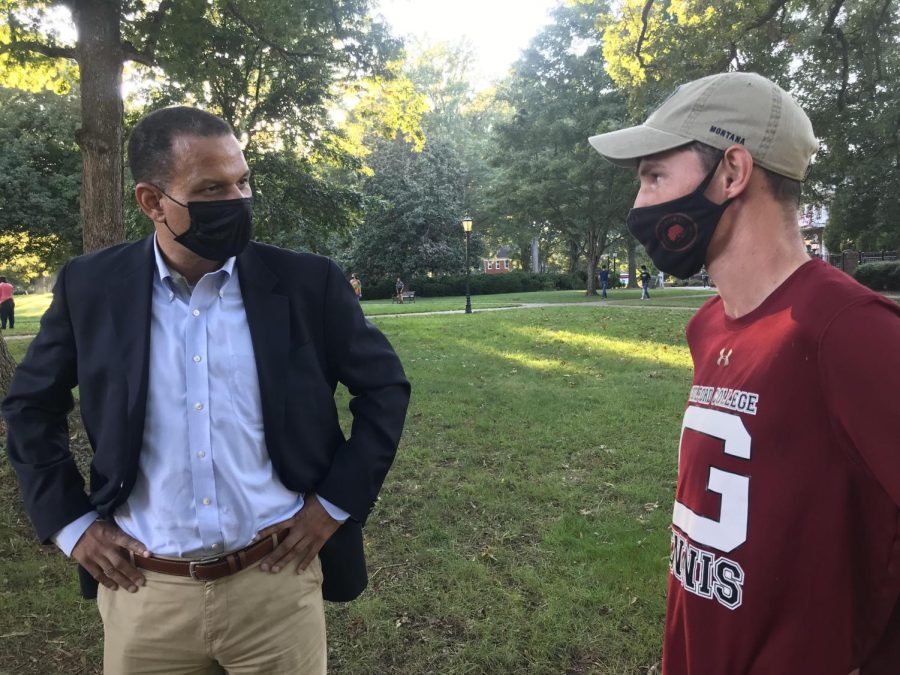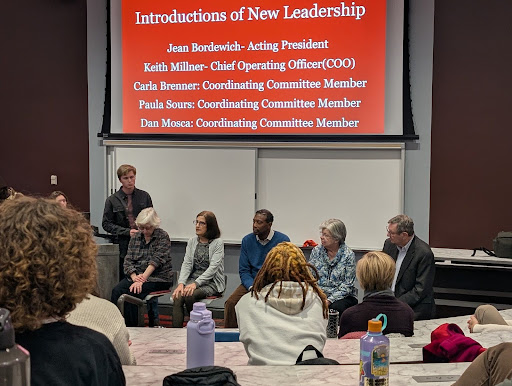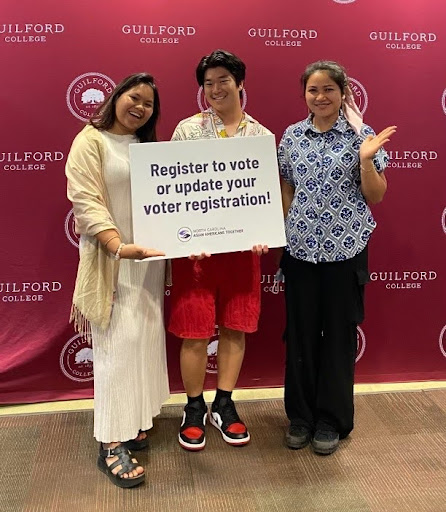Guilford welcomes new President Kyle Farmbry
On Wednesday, Oct. 6, the Guilford community received an email from Board of Trustees Chair Ed Winslow announcing that the year-long search for a new Guilford College president was over. In the email Winslow shared that Kyle Farmbry, a professor of public administration and former Dean of Rutgers University’s Graduate School, has been appointed as Guilford’s 10th president and will begin serving on Jan. 1, 2022. Farmbry will also be the College’s first African American president.
Shortly after the announcement of his appointment, Farmbry visited Guilford to get to know the community he will soon be leading. In addition to meeting with members of the College’s administration, faculty and staff, Farmbry also spent time meeting with members of the Guilford student body. Farmbry participated in a student meet and greet on Tuesday, Oct. 12, on the Founders lawn, where pizza and other goodies were provided.
On Wednesday, Oct. 13, Farmbry continued this effort to connect by meeting one-on-one with several students in leadership positions in the cafeteria atrium. During this informal get together, students asked Farmbry questions about his background, his motivation to become Guilford’s 10th president, and his plans for improvements to the College going forward.
Farmbry spoke first about his background in higher education, and the previous positions which led to him seeking the presidential position.
“I’d known that I wanted to be in higher ed administration for a number of years,” Farmbry said. “I served for about six years as Dean of the Graduate School at Rutgers Newark, and there are several places that you go after being a dean. You can move into a provost role, you can move into a presidency role, you can go back to being a faculty member again; but I knew I wanted to have some sort of a different role. It was really a question of where.”
Farmbry shared that he was drawn to Guilford because of the institution’s Quaker roots.
“I heard that Guilford was a Quaker-founded institution, and I went to a Quaker school for seventh and eighth grade, and that time really had a tremendous impact on how I came to look at the world,” Farmbry said. “The more I learned about Guilford, I said to myself ‘well if an opportunity at Guilford pops up I’d love to investigate further.’ Then back in May I saw the listing for the presidency here, and I said ‘well this might be the opportunity at Guilford.’ So I sent my information, got to learn more about the institution and read up on Guilford and saw a lot of the spirit of community, sense of activism, and I learned that there were people majoring in peace studies and in community and justice studies. As I became more and more familiar with the school I thought this would be a great place to spend this next stage of my career”
When sharing his policy plans and vision for Guilford’s future, Farmbry spoke about the financial crisis Guilford has endured in recent years—which was exacerbated by the COVID-19 pandemic. He discussed the Save Guilford College initiative, a grassroots movement consisting of Guilford alumni and community members. At a time when the College, under previous administration, was set to slash almost half of all academic majors and fire dozens of faculty (including those who had tenure) in a last-ditch effort to keep Guilford’s head above water financially, Guilford’s community banded together, protested, hosted teach-ins, and ultimately raised millions of dollars to stop this from happening.
Farmbry shared that he read coverage about the Save Guilford movement in the news last year, and said the alumni involvement that drove the movement is a component of his future financial plan for the College.
“I think when you take a look at the mobilization that occurred very rapidly, and the Save Guilford 6 million dollar campaign…. You can see that you have alumni involved and you’ve got students and faculty involved. So I think that it was clear to me that there is a lot of energy here, and a lot of energy in the alumni community. So part of (my financial) strategy is one of tapping into that energy as much as possible.”
He not only mentioned motivating the alumni community and the student body to participate in fundraising and enrollment, he also spoke about his own personal responsibilities as president.
“A big part of my job will be going out and talking to foundations, corporations, government partners, and others to have them think about Guilford as a partner,” Farmbry said. “I don’t think we can completely separate that the challenges Guilford came into also happened during a very tough time nationally. COVID was a reality. There was a point in time during early 2020 when there was very, very little revenue coming to the school and there was some panic at that time. Hopefully we are at the tail end of this COVID crisis, but we also need to figure out how to be ready if something along the lines of COVID—or even a worse case scenario—comes along, and how we can strengthen the institution to be able to handle it.”
In addition to discussing ways the College can fortify itself against future crises and financial hardships, Farmbry emphasized community. He talked about rebuilding student engagement through community get togethers, including gatherings he plans to throw himself at Ragsdale—also known as the President’s house.
“I will live on campus over in Ragsdale, and the nice thing about living on campus is I will be able to walk around and get an idea of community as it’s developing,” Farmbry said. “I’ll be able to have folks over. Ragsdale is a big place purposefully, because it is a place that should be used for having group dinners and picnics on the lawn… and that’s part of what being able to live on campus enables me to do.”
Farmbry wants to actively go out and build community, which means hosting gatherings himself, but also means connecting students with opportunities in the greater Greensboro area and beyond. He discussed that building these relationships, along with building connections with alumni, is essential in helping students find their future careers and feel connected to their community.
“We need to have an active practice to land you all jobs,” Farmbry said. “My role now, and in the future, is to come with hat in hand and help Guilford College students… The College has a responsibility in terms of helping you to land your next opportunity.”









